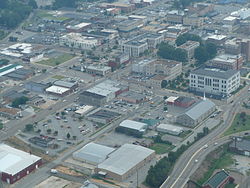
Back جاكسون (تينيسي) Arabic جاكسون (ماديسون) ARZ جکسن، تنسی AZB Джэксан (Тэнесі) Byelorussian Джаксън (Тенеси) Bulgarian Jackson (Tennessee) Catalan Джексон (Теннесси) CE Jackson (kapital sa kondado sa Tinipong Bansa, Tennessee) CEB Jackson, Tennessee Welsh Jackson (Tennessee) German
Jackson, Tennessee | |
|---|---|
 Aerial View of Jackson | |
| Nickname: Hub City | |
 Location of Jackson in Madison County, Tennessee | |
| Coordinates: 35°36′52″N 88°48′50″W / 35.61444°N 88.81389°W | |
| Country | United States |
| State | Tennessee |
| County | Madison |
| Founded | 1821 |
| Incorporated | 1845[1] |
| Named for | Andrew Jackson |
| Government | |
| • Mayor | Scott Conger (since 2019) |
| Area | |
| • Total | 58.75 sq mi (152.17 km2) |
| • Land | 58.74 sq mi (152.14 km2) |
| • Water | 0.01 sq mi (0.03 km2) |
| Elevation | 410 ft (125 m) |
| Population | |
| • Total | 68,205 |
| • Density | 1,161.07/sq mi (448.30/km2) |
| Time zone | UTC−6 (Central) |
| • Summer (DST) | UTC−5 (CDT) |
| ZIP Codes | 38301-38303, 38305, 38308, 38314 |
| Area code | 731 |
| FIPS code | 47-37640[4] |
| GNIS feature ID | 1289178[5] |
| Website | City of Jackson Official Website |
Jackson is a city in and the county seat of Madison County, Tennessee, United States. Located 70 miles (110 km) east of Memphis, it is a regional center of trade for West Tennessee. Its total population was 68,205 as of the 2020 United States census.[6] Jackson is the primary city of the Jackson, Tennessee metropolitan area, which is included in the Jackson-Humboldt, Tennessee combined statistical area. Jackson is Madison County's largest city, and the second-largest city in West Tennessee after Memphis.[7] It is home to the Tennessee Supreme Court's courthouse for West Tennessee, as Jackson was the major city in the west when the court was established in 1834.
In the antebellum era, Jackson was the market city for an agricultural area based on cultivation of cotton, the major commodity crop. Beginning in 1851, the city became a hub of railroad systems ultimately connecting to major markets in the north and south, as well as east and west. This was key to its development, attracting trade and many workers on the railroads in the late 19th century with the construction of railroads after the American Civil War. Through the 1960s, the city was served by 15 passenger trains daily, but industry restructuring reduced such service and caused the loss of jobs. The economy has adjusted to new businesses, with major manufacturing in the area.
- ^ "Tennessee Blue Book" (PDF). State.tn.us. 2005–2006. pp. 618–625.
- ^ "ArcGIS REST Services Directory". United States Census Bureau. Retrieved October 15, 2022.
- ^ Cite error: The named reference
USCensusDecennial2020CenPopScriptOnlywas invoked but never defined (see the help page). - ^ "U.S. Census website". United States Census Bureau. Retrieved January 31, 2008.
- ^ "US Board on Geographic Names". United States Geological Survey. October 25, 2007. Retrieved January 31, 2008.
- ^ "Population and Housing Unit Estimates". Retrieved July 18, 2019.
- ^ "Find a County". National Association of Counties. Archived from the original on May 31, 2011. Retrieved June 7, 2011.
© MMXXIII Rich X Search. We shall prevail. All rights reserved. Rich X Search


